My Girlfriend's Secret Life as an Assassin
Jason P. Howe, a globe-trotting photographer, met his match in Marylin, a beautiful young woman with a shocking dark side.

It was a chance meeting, at a bus station in a backwater town in a war-ravaged region of Colombia. Jason P. Howe, a British photojournalist with a boyish face and a gap-toothed grin, spotted a striking young woman in line to buy coffee. She was petite, with shoulder-length dark hair framing sculpted cheekbones, and a confident spark. She told him her name was Marylin. She was 22 years old, on her way home to the southwestern city of Puerto Asís after a shopping trip, she said. As fate would have it, Jason was headed there, too.
Jason, nearly 30 at the time, was documenting the country's catastrophic civil conflict. He'd just spent time with the Revolutionary Armed Forces of Colombia (FARC), the notorious leftist rebels who have been trying for decades to overthrow the government. (Their most notable recent triumph was holding hostage French-Colombian presidential candidate Ingrid Betancourt for six years.) The rebel group's goal: to install a socialist regime to close the gap between rich and poor. More than 80 percent of rural Colombians live below the poverty line, while a tiny handful of wealthy landowners and drug lords control the country's assets—including the world's largest cocaine-producing industry, which supplies an estimated $25 billion worth of the drug each year to the U.S. alone.
After leaving the FARC's jungle camps, Jason wanted to photograph the other fighting forces—namely, the U.S.-backed Colombian military and a raft of right-wing death squads. Known as paramilitaries, the squads are private militias formed to protect the rich elite against kidnapping and extortion by the FARC, and are unofficially backed by the Colombian government to wage a dirty war against the rebels and their sympathizers.
When he met Marylin, Jason was on his way to the paramilitary stronghold of Puerto Asís to try to make contact with death-squad personnel. Marylin told him she had friends in both the paramilitaries and the government-run military. "I'll introduce you," she offered. "And you must come and live with my family while you work. My father runs a roadside bar where lots of soldiers and paras hang out. We have plenty of space." Jason, traveling alone as a freelancer without an expense budget for hotels, couldn't believe his luck.
Now 37, Jason is recounting his tale as he reclines on a sofa at a photo gallery in Bangkok, digesting a lunch of fiery Thai noodles. Sporting a beard in preparation for a forthcoming assignment in Afghanistan, he is a renowned war photographer for publications such as The New York Times and The Times of London. All around us on the walls are photos he took in Colombia over the course of five grueling years: powerful images of dead soldiers beside a booby-trapped bus, mothers fleeing from sniper fire and clutching their babies, mourners at a funeral for an assassinated schoolteacher gunned down in front of her class. Jason is ready to talk about his "life-changing" association with Marylin, he says, so he can finally put their affair to rest and move on with his life.
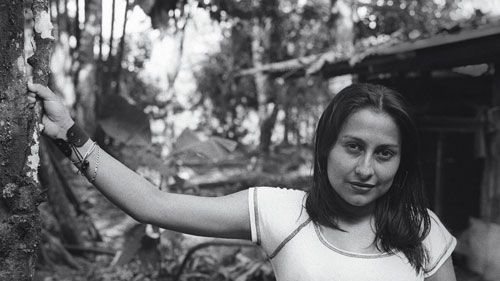
Marylin in the backyard of her family\'s tin-roof house.
Jason and Marylin sat side by side for the four-hour bus ride, speaking in basic Spanish. She was different from the pampered beauty-queen types he'd met in the capital, Bogotá; she had a dynamic, self-sufficient air. That evening, after arriving at Marylin's home three miles outside the city, the pair walked down a dirt path to the local river, held hands, and kissed by the mud-colored water. The romance went no further right away, since Marylin, a single mother, shared a bed with her 4-year-old daughter, Natalie, and the walls of the tin-roofed house she shared with her parents and older brother were wafer-thin
Jason was charmed by the basic life of Marylin's family. "I loved it," he says. "There were chickens running around; the tropical greenery grew in front of your eyes. The family washed their clothes in the river and cooked over wood fires. It was boiling hot, and everyone worked hard doing domestic chores. I loved how uncomplicated it was." In the evenings, after a dinner of chicken and rice, he and Marylin would spend long hours chatting with each other, curled up in a hammock.
Stay In The Know
Get exclusive access to fashion and beauty trends, hot-off-the-press celebrity news, and more.
Despite their different backgrounds, they had more in common than it first appeared—at least on the surface. Jason had grown up in a working-class family in the small town of Woodbridge, northeast of London, and was raised as a Jehovah's Witness. He'd rebelled in his teens, rejecting his religion and leaving school with only a certificate in typing. "My family didn't expect me to amount to more than a supermarket clerk or a window cleaner," he says. At 17, he found a job in a camera shop and worked there for eight years, developing a passion for photography and a desire for foreign adventure. Marylin, too, had dropped out of school and pursued an adventure of her own, flouting Colombia's strict Catholic mores by having a child out of wedlock.
After meeting Marylin, Jason spent the next couple of months going on jaunts outside Puerto Asís to meet paramilitaries. But every few days he would return to Marylin's family. He adored Natalie, Marylin's mischievous daughter, and the three of them became inseparable. Eventually, he ran out of cash and had to return to England for a few months. When Marylin kissed him good-bye with the words, "Please don't forget us—you're part of the family now," he shared the sentiment.
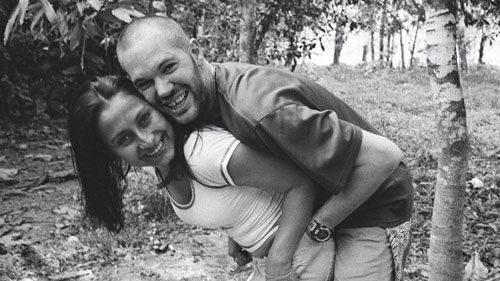
British photojournalist Jason P. Howe and his Colombian girlfriend, Marylin, not long after they met.
The couple had to wait for more than a year before they could take their romance further; the Iraq War had broken out, and Jason was sent to cover its early stages. But he couldn't get Marylin out of his mind, and, when he finally returned to Colombia, he was determined to up the ante on their so-far virtually chaste relationship. He decided to base himself in a cheap hotel in the city so he and Marylin could be alone together at last. "She came to my room, and we shared a bottle of wine and finally made love," he says. Afterward, as an old ceiling fan lost its battle with Puerto Asís's intense humidity, they lay naked in each other's arms all night, drifting in and out of sleep in a state of bliss.
"At dawn, Marylin said she had something to tell me," Jason remembers. She suddenly grew very tense, her face hardening as she attempted to control her agitation. There was no way Jason could have imagined what would come next. He knew she had some connection with the paramilitaries; what he didn't know was that she'd become a full-fledged member of a right-wing death squad, and was now working as a "special operative," she said. Her job was to find and kill traitors and informers. She confessed to executing 10 men and women by her own hand so far, mostly ordinary civilians, after her group had "investigated" them and found them to be helping the FARC. "She said she went by motorbike and either shot her targets in the head, used a knife, or, more rarely, injected them with a syringe full of air," says Jason, exhaling in a deep, incredulous sigh. The woman he was falling madly in love with was an assassin.
Jason sat up on the bed soaked with sweat from the leaden morning air, and tried to take in what she was telling him amid the honking traffic and shouting food vendors in the streets outside his window. "I lit a cigarette while Marylin studied me with a petrified expression," he says. "She was scared I was going to freak out, but I didn't. After our night together, my attraction to her was even more powerful, and I didn't want anything to ruin that. I remember just nodding my head slowly and not saying very much at all. The relief on her face was instant."
In fact, Jason admits, part of him found her confession thrilling. "I didn't think too deeply at that stage about who she was killing or her methods of doing it," he says. "It just felt surreal, like I was living in some kind of exciting war-zone fantasy. I rationalized it by thinking, OK, she's just another soldier in this conflict, and how is this different from dating someone in the army back home?"
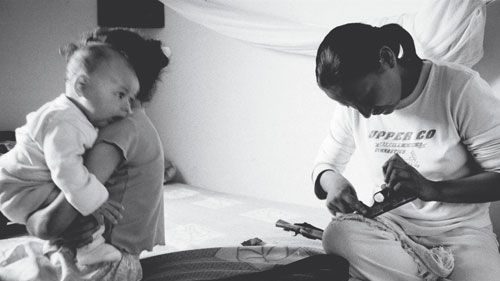
Marylin cleans her gun in her bedroom, while her niece and cousin play.
Jason and Marylin continued sleeping together in his torpid hotel room over the next few weeks, and he grew used to her pistol lying on the bedside table. Now that her secret was out, Marylin became so matter-of-fact about her murderous alter ego that she even cleaned her gun in front of Natalie. Then one evening, some of Jason's foreign-journalist friends arrived in town. They'd hired a "fixer"—a local man who would help connect them with sources—and during drinks, the fixer recognized Marylin as a known paramilitary killer, and told Jason he was "out of his mind" to be dating her. American photographer Eros Hoagland was present that night: "It was incredible," he says. "Even the hotel waiter was visibly spooked when he saw Marylin. Everyone seemed to know who she was, and she seemed to enjoy the fact that they feared her." Hoagland describes Marylin as "very friendly," but says he and his colleagues decided to leave town the moment they realized who she was—just being seen with her made them marked men. Jason was furious and ignored their insistence that he go with them. "They called me an idiot," Jason says. "But I stayed."
Garry Leech, editor of the online Colombia Journal and author of several books on the country, confirms that Jason's involvement with Marylin could have cost him his life. "Journalists are prime targets for assassinations because they can so easily be accused of being informers for one side or the other," he says. "Jason could have been killed by the FARC for his relationship with a known paramilitary, or he could have been murdered by the paramilitaries themselves if they didn't like one of their female operatives being involved with a foreign journalist." Although all sides in Colombia's war are guilty of human-rights abuses, Leech adds that historically, the right-wing paramilitary death squads have been by far the worst perpetrators, responsible for perhaps 70 percent of killings of unarmed civilians. On a really bad weekend in Puerto Asís alone, a city of only 70,000 people, there could be up to 25 fresh corpses in the morgue.
It just felt surreal, like I was living in some kind of exciting war-zone fantasy.
But Jason was immersed in the romantic intensity of it all. With his Leica camera, he took loving portraits of Marylin to try to understand her shocking dual identity. In one grainy black-and-white photo, she sits on a battered sofa in her kitchen, smiling as she reads a bedtime story to Natalie and two nephews, cuddling them close. In the background, a jumble of cooking pots and an ancient electric oven complete the cozy domestic scene. "I looked at Marylin through my viewfinder and tried to imagine her putting a gun to someone's head and pulling the trigger," Jason recalls. "It was impossible to visualize."
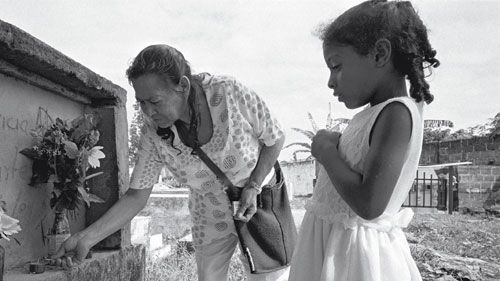
Marilyn\'s mother and daughter place flowers on her tomb.
One morning over toast and eggs a few weeks after the fixer's warning, Marylin casually mentioned that the previous night, she'd killed a woman she'd been hunting for some time. "She told me she'd persuaded a friend to help her decapitate and dismember the woman, and that they'd thrown her head and limbs into different rivers to make the body disappear," Jason says. He put down his knife and fork, unable to eat another mouthful. Feeling nauseated, he realized that something about her story didn't add up—usually the paramilitaries left the corpses of informers on gruesome display to act as a warning to others.
"What had the woman you executed done?" Jason asked her. "Was she a rebel sympathizer?"
"No," she replied. "A friend paid me $300 to get rid of her because she'd been sleeping with my friend's boyfriend."
Jason was horrified.
"This was the breaking point for me," he says. "It was one thing to kill for a cause, no matter how dubious, but quite another to be taking life purely for money. A wave of revulsion hit me."
Jason's immediate instinct was to put some distance between them, but then his cash flow dried up—rebels had blown up a power station, disabling money-transfer services—so he had to move back into Marylin's home. In such a dangerous city where few people could be trusted, it was the only safe place he knew. "It was very uncomfortable because I didn't want to be around her," he says. "But she couldn't understand what had changed, so we argued, and she cried a lot." In some ways, too, he was still conflicted about his feelings for the woman he'd shared so much with, and he couldn't let go just yet. At least, he says, his enduring sexual attraction to her no longer complicated things, since it was impossible for them to be intimate in her family's house.
One day, after yet another argument, a tearful Marylin pulled out her gun and pointed it at Jason's forehead. "Aren't you scared of me?" she screamed at him. "Why aren't you scared of me?" Jason knew there was a possibility that she might kill him, or that her superiors could order her to do so. He knew he had to leave.
His final days with Marylin were spent in a futile attempt to understand the killer in her. "I hoped she was going to say she was doing it to earn money to pay for Natalie's schooling or future, something vaguely redeeming like that," he says. Instead, "she just shrugged and said she spent the money on clothes and makeup."
In an expressionless voice, Marylin admitted to being afraid, at least when she began her career as a killer. "The first was very hard, because the person I executed was kneeling down begging not to be killed," she told Jason. "The person was crying, saying, 'Please don't kill me. I have children.' That's why it was difficult and sad. After the killing, you can't talk or eat. You just keep trembling." But the second time, she said, it got a little easier, and by the time she'd killed 23 people, she no longer felt anything at all. She just felt "normal."
"I asked her why she became a paramilitary, and she didn't have a good reason, nor did she have a good reason for why she'd started doing contract killings," Jason says. She told him that she had approached the militias herself to see if she could join up, because she wanted "excitement, and to find out if she had the capacity to kill."
Colombia expert Leech explains that many young people like Marylin who join paramilitary groups are simply desensitized to the impact of violence. "Tragically, young Colombians have lived with conflict their entire lives," he says. "It's the norm for them."
The day Jason said good-bye to Marylin, feeling a mixture of sadness and relief, he couldn't resist one last-ditch attempt to persuade her to give up her cold-blooded killing. "Maybe it wasn't my place to judge, but I told her that she had no excuse for what she did," he says. "There are millions of people in desperate, violent situations all over the world, and most of them don't go around shooting people for a living. Did she really think she was doing any good for Colombia by perpetuating the cycle of violence?" A couple of months later, he received her reply, via e-mail. "I'm sorry for the way I am," she wrote. "Nobody has ever spoken to me the way you did, and it made me think. I want to start a new life, maybe do a nursing course. But I'm afraid the paras will kill me if I try to leave." At the end, she added a plaintive request: "Please help me. You're the only person who can."
"Please help me. You're the only person who can."
Jason was back in Iraq by this time, "photographing three suicide bombings a day." He took a few weeks to write back, but when he did, there was no reply. He tried a different e-mail address, but still no answer. Despite everything, he was still unable to break his forceful bond with Marylin, and he feared that something terrible had happened to her. Compelled to find out, he returned to Colombia in early 2005, a year after he'd left, and took the bus back to Puerto Asís.
When he arrived at the house, Marylin's father opened the door, and Jason knew instantly from the man's crumpled face that Marylin was dead. The two men shared a beer in "emotional silence" next to the hammock in the front yard where Jason and Marylin had lain in each other's arms so many times. Jason felt unbearably sad—sad for Marylin, but also for her victims, and most of all for her daughter, Natalie. What chance would the little girl have in life now? How long before she grew up and fell victim to the same destructive forces that had overtaken her mother?
Later that day, Jason contacted a local woman he knew to find out what had happened. On October 14, 2004, Marylin, then age 25, had been abducted by members of her own group and stoned to death. Her skull was crushed with rocks, and then she was shot, allegedly for being an informer. Jason has no way of knowing if this was the real reason; it could have been so many things, from attempting to start a new life to getting on the wrong side of someone after a contract killing—or even because of her involvement with Jason. He finds it too unsettling to speculate.
Today, in Bangkok, Jason is getting ready to depart for his assignment in Afghanistan, and he is fretting about how he's going to get more than 200 pounds of luggage—including his flak jacket and hard-shelled, bomb-proof suitcases—on the plane without paying any excess fees. He still has no permanent home. Appropriately enough, his assignment there is to document nomads.
He has had a few relationships since Marylin, usually with women who are working in the same danger zones as he is. "I'm attracted to women who lead fascinating lives that interest and inspire me. It's not that I'm looking to replace the excitement I felt with Marylin," he says. "I've just never gone for wallflowers." Still, due to his itinerant lifestyle, his relationships usually don't survive for more than a few months, and, while he accepts that with typical macho stoicism, he confesses that he often chokes up in movies about unfulfilled love and loss, such as The Bridges of Madison County and Atonement. "The emotion has to come out somehow," he says, smiling ruefully.
As for Marylin, Jason quotes from a journal he kept at the time: "I doubt I will ever learn the whole truth. Marylin, like the people she killed, had simply become another casualty in a dirty, forgotten war."
-
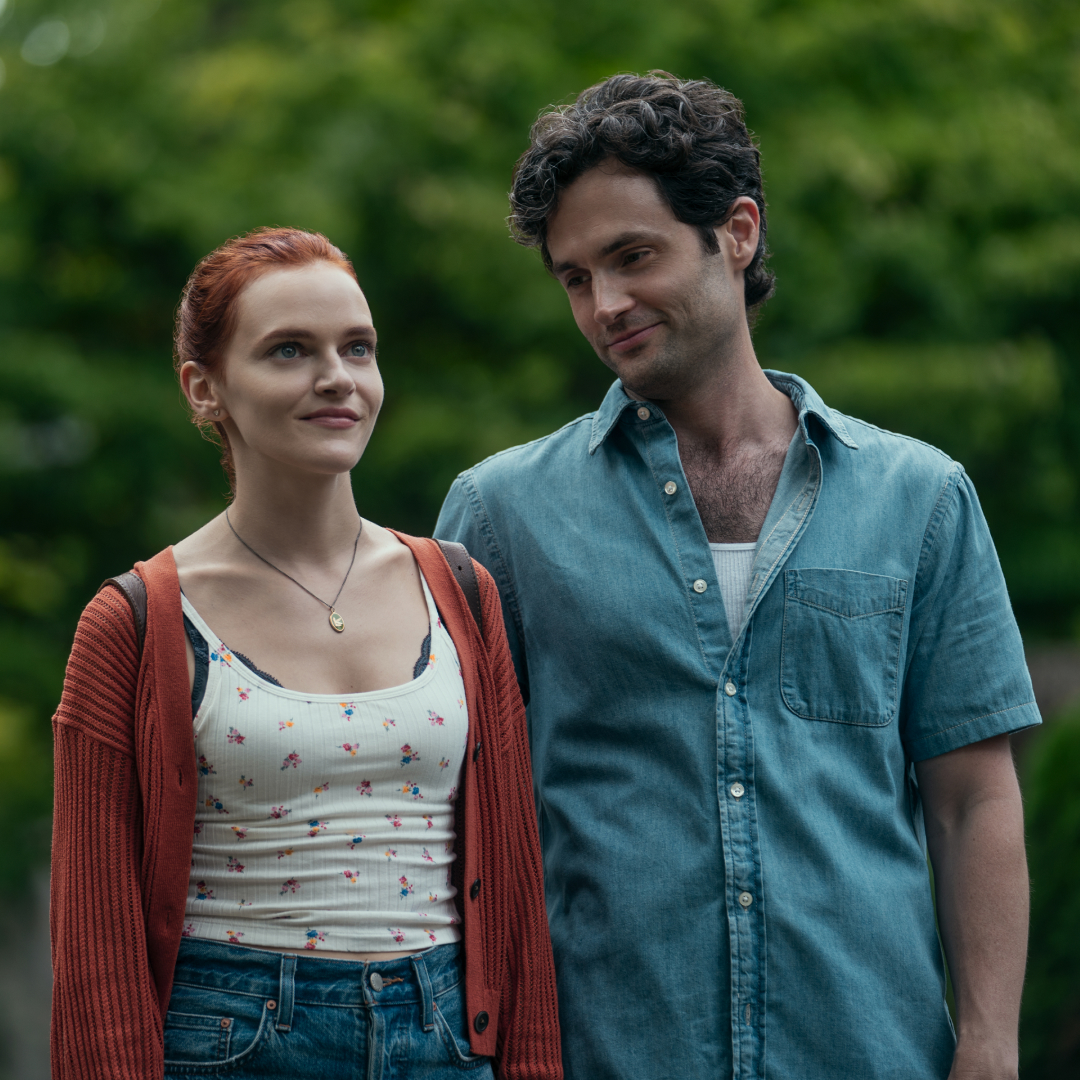 The 'You' Season 5 Cast Features People From Joe's Past, a New Love Interest, Madcap Twins, and More
The 'You' Season 5 Cast Features People From Joe's Past, a New Love Interest, Madcap Twins, and MoreHere's what to know about the star-studded final installment of the Netflix hit.
By Quinci LeGardye
-
 These J.Crew Sale Finds Basically Packed My Suitcase for Me
These J.Crew Sale Finds Basically Packed My Suitcase for MeI'm ready for my next vacation.
By Brooke Knappenberger
-
 Summer's Sportiest Shoe Trend Is Worth Shopping More Than Once
Summer's Sportiest Shoe Trend Is Worth Shopping More Than Once17 pairs from Nordstrom, Mango, and Zara I'm shopping now.
By Julia Marzovilla
-
 30 Female-Friendly Porn Websites for Any Mood
30 Female-Friendly Porn Websites for Any MoodFeatures All the best websites, right this way.
By Kayleigh Roberts
-
 The 82 Best Cheap Date Ideas for Couples on a Budget
The 82 Best Cheap Date Ideas for Couples on a Budget"Love don't cost a thing." —J.Lo
By The Editors
-
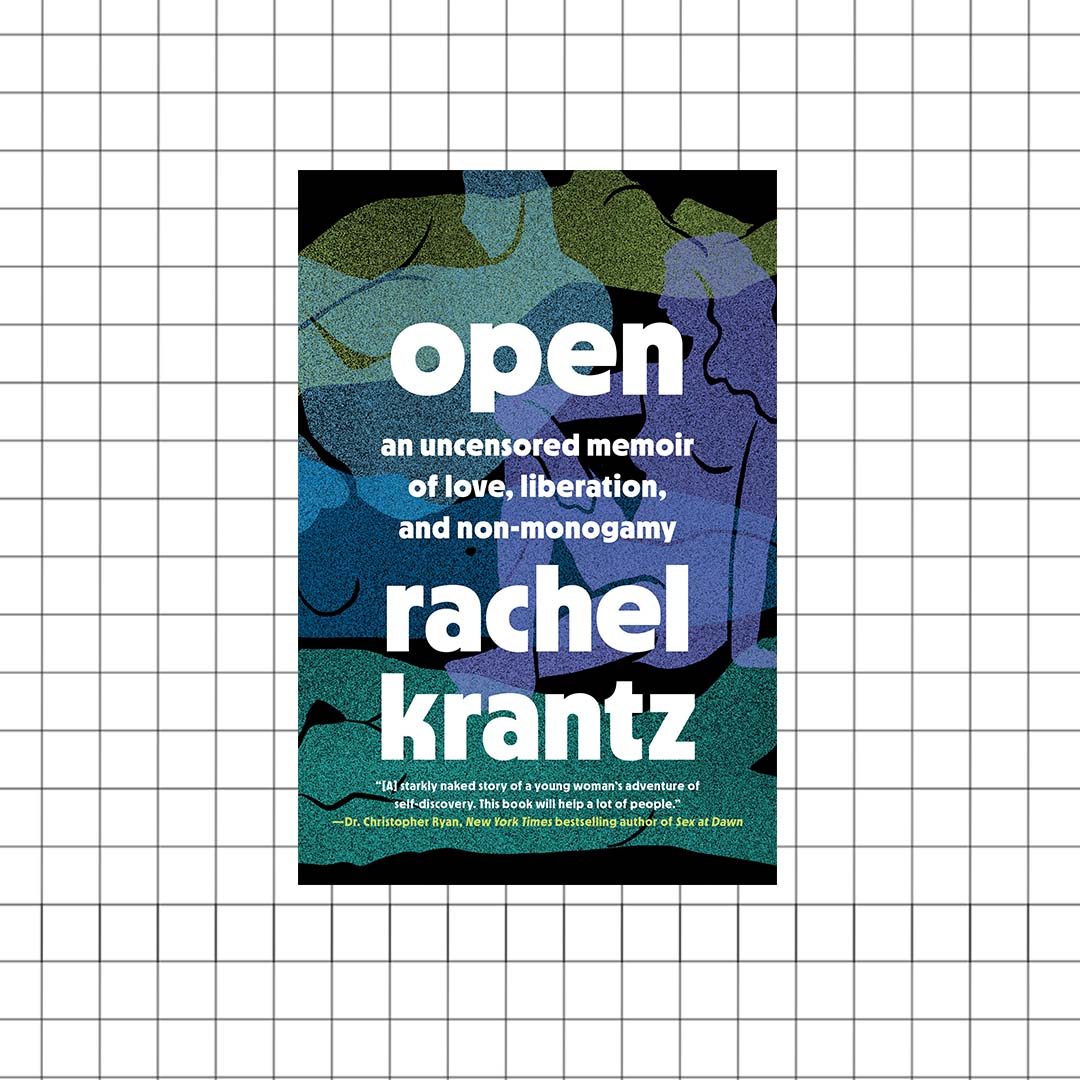 Diary of a Non-Monogamist
Diary of a Non-MonogamistRachel Krantz, author of the new book 'Open,' shares the ups and downs of her journey into the world of open relationships.
By Abigail Pesta
-
 COVID Forced My Polyamorous Marriage to Become Monogamous
COVID Forced My Polyamorous Marriage to Become MonogamousFor Melanie LaForce, pandemic-induced social distancing guidelines meant she could no longer see men outside of her marriage. But monogamy didn't just change her relationship with her husband—it changed her relationship with herself.
By Melanie LaForce
-
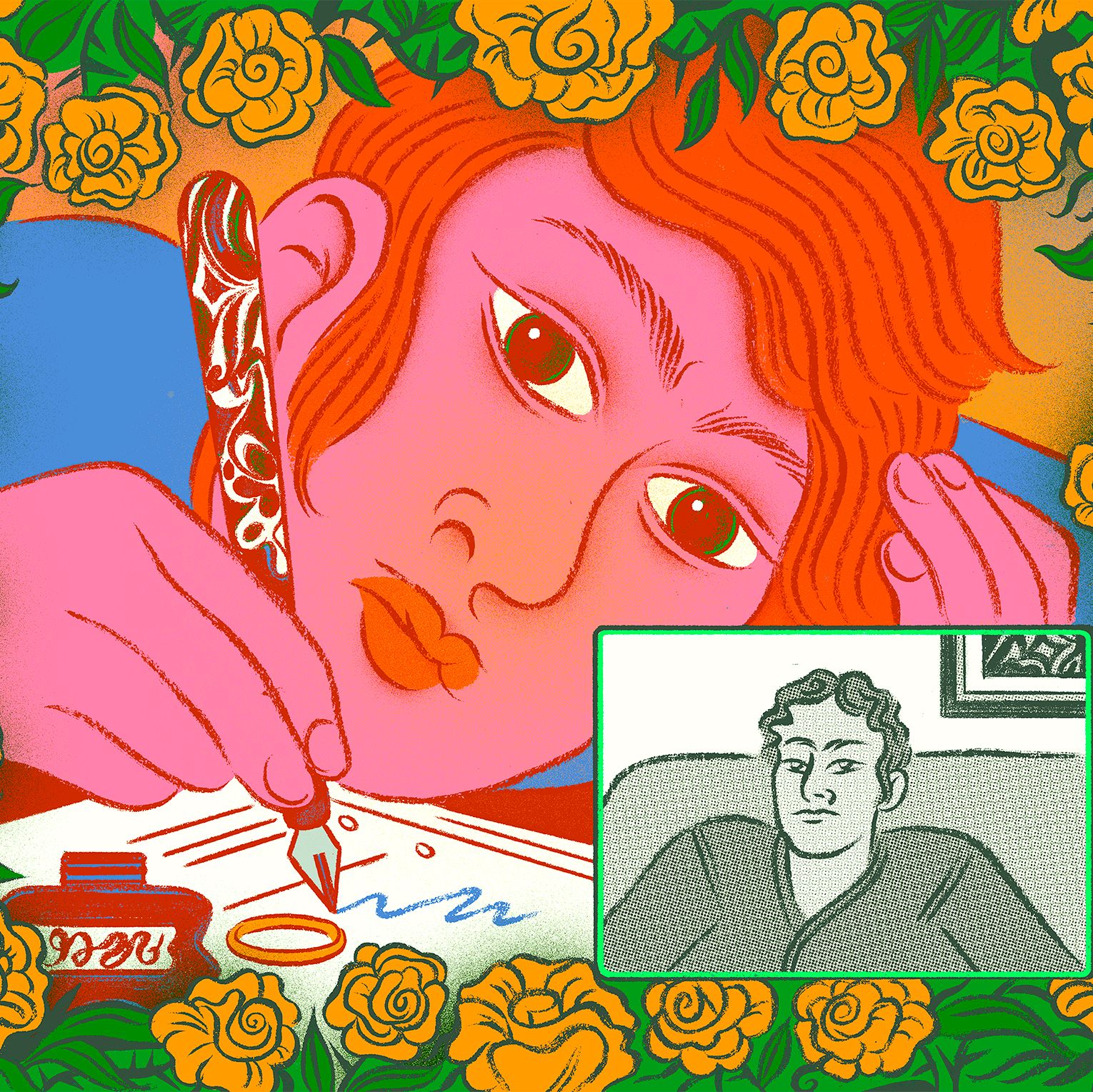 COVID Uncoupling
COVID UncouplingHow the pandemic has mutated our most personal disunions.
By Gretchen Voss
-
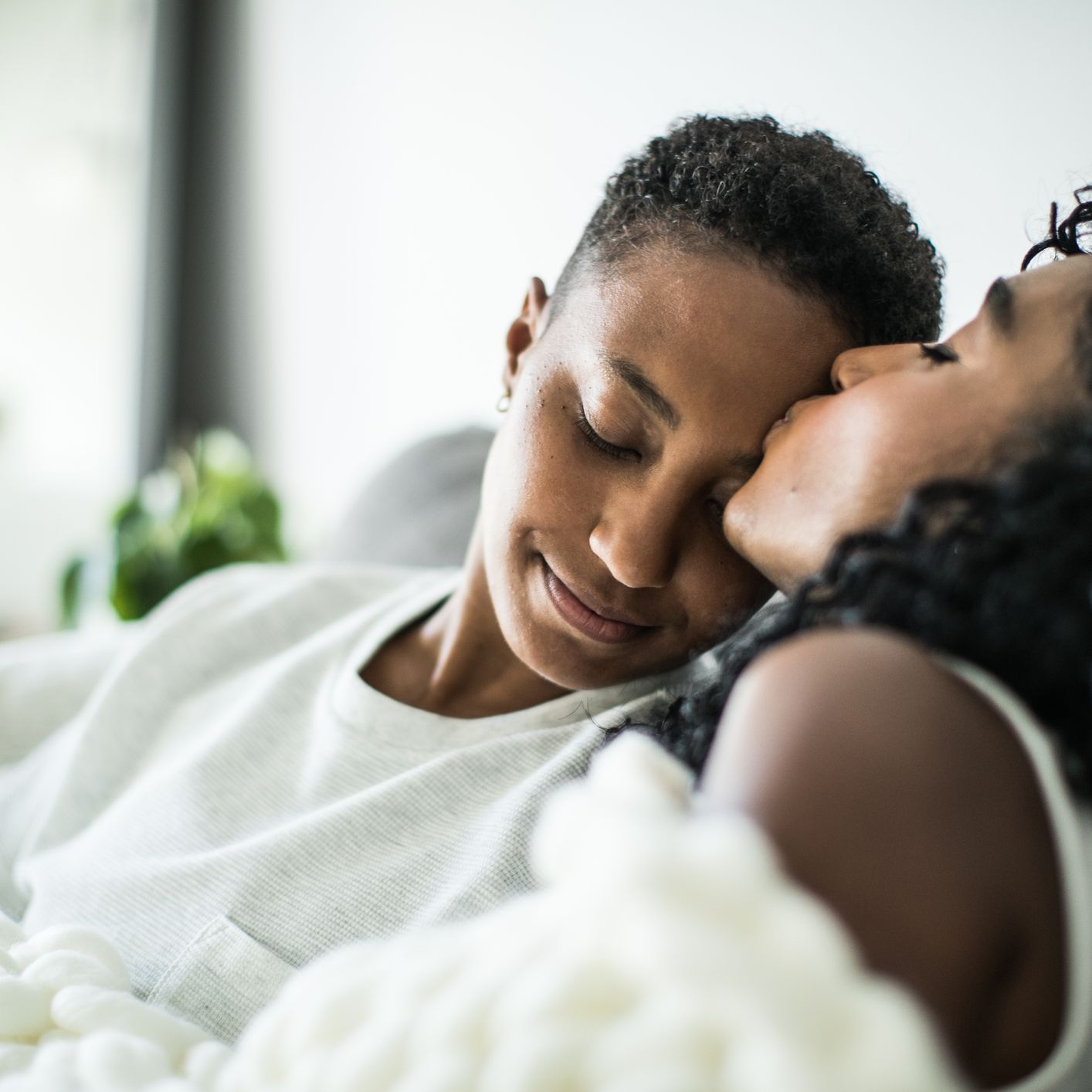 16 At-Home Date Ideas When You're Stuck Indoors
16 At-Home Date Ideas When You're Stuck IndoorsFeatures Staying in doesn't have to be boring.
By Katherine J. Igoe
-
 Long Distance Relationship Gift Ideas for Couples Who've Made It This Far
Long Distance Relationship Gift Ideas for Couples Who've Made It This FarAlexa, play "A Thousand Miles."
By Jaimie Potters
-
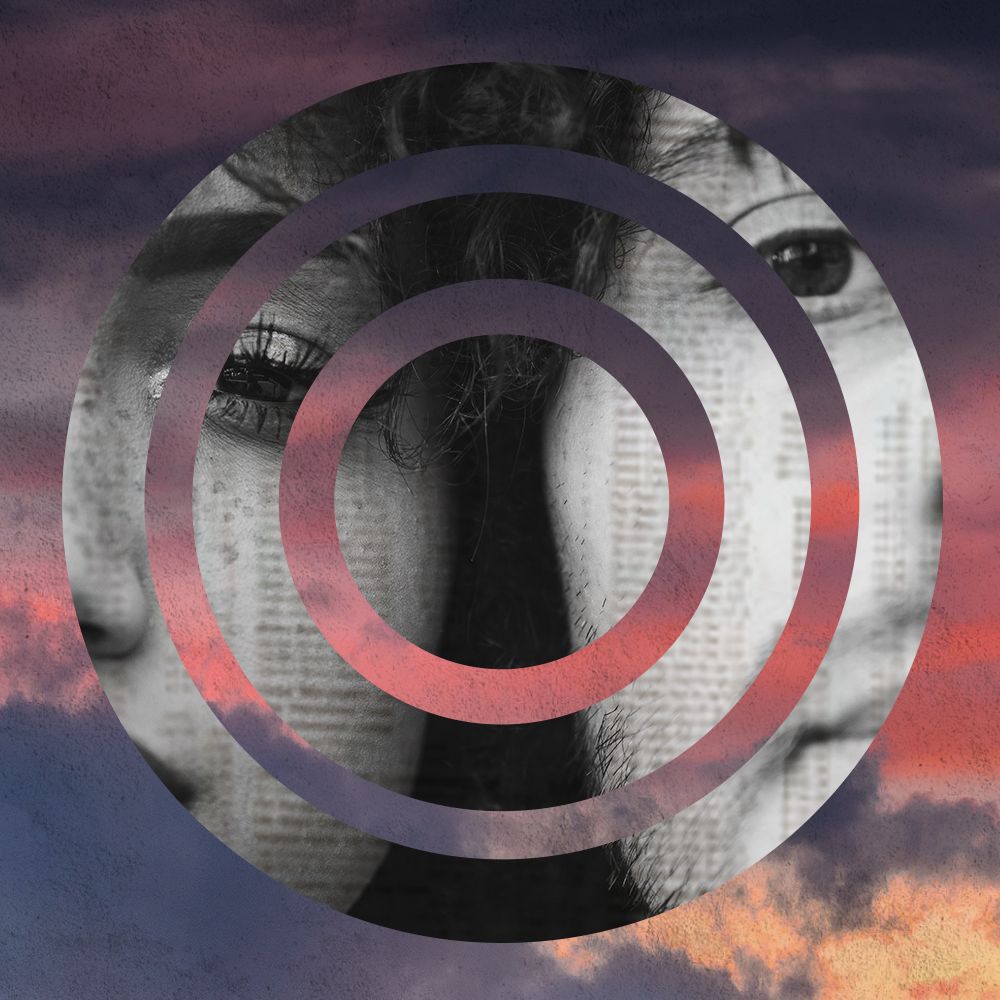 15 Couples on How 2020 Rocked Their Relationship
15 Couples on How 2020 Rocked Their RelationshipFeatures Couples confessed to Marie Claire how this year's many multi-stressors tested the limits of their love.
By Sherry Amatenstein, LCSW